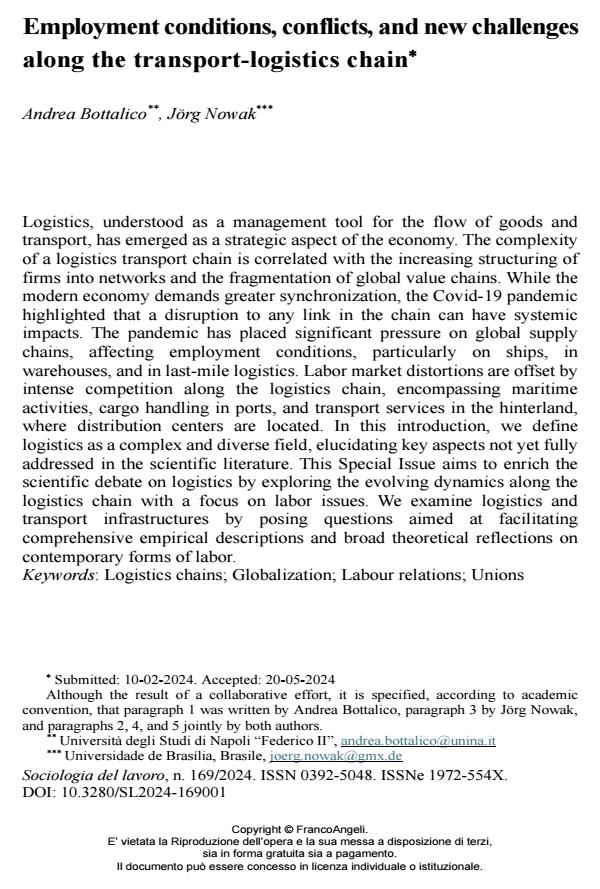Employment conditions, conflicts, and new challenges along the transport-logistics chain
Journal title SOCIOLOGIA DEL LAVORO
Author/s Andrea Bottalico, Jörg Nowak
Publishing Year 2024 Issue 2024/169
Language English Pages 15 P. 9-23 File size 188 KB
DOI 10.3280/SL2024-169001
DOI is like a bar code for intellectual property: to have more infomation
click here
Below, you can see the article first page
If you want to buy this article in PDF format, you can do it, following the instructions to buy download credits

FrancoAngeli is member of Publishers International Linking Association, Inc (PILA), a not-for-profit association which run the CrossRef service enabling links to and from online scholarly content.
Logistics, understood as a management tool for the flow of goods and transport, has emerged as a strategic aspect of the economy. The complexity of a logistics transport chain is correlated with the increasing structuring of firms into networks and the fragmentation of global value chains. While the modern economy demands greater synchronization, the Covid-19 pandemic highlighted that a disruption to any link in the chain can have systemic impacts. The pandemic has placed significant pressure on global supply chains, affecting employment conditions, particularly on ships, in warehouses, and in last-mile logistics. Labor market distortions are offset by intense competition along the logistics chain, encompassing maritime activities, cargo handling in ports, and transport services in the hinterland, where distribution centers are located. In this introduction, we define logistics as a complex and diverse field, elucidating key aspects not yet fully addressed in the scientific literature. This Special Issue aims to enrich the scientific debate on logistics by exploring the evolving dynamics along the logistics chain with a focus on labor issues. We examine logistics and transport infrastructures by posing questions aimed at facilitating comprehensive empirical descriptions and broad theoretical reflections on contemporary forms of labor.
Keywords: Logistics chains; Globalization; Labour relations; Unions
- La Corte di Strasburgo si esprime sulla liceità dei blocchi stradali alla luce dell'art. 11 CEDU (e parla anche al legislatore italiano) Giovanni Orlandini, in GIORNALE DI DIRITTO DEL LAVORO E DI RELAZIONI INDUSTRIALI 185/2025 pp.143
DOI: 10.3280/GDL2025-185008 - An Adaptive Lag Trap in Socio-Technical Systems: The Paradoxical Effect of Digitalization and Labor on Logistics Investment in China Keming Chen, Chunxiao Huang, Ting Wang, Tianqi Zhu, Tingting Li, Dan Zhao, in Systems /2025 pp.693
DOI: 10.3390/systems13080693
Andrea Bottalico, Jörg Nowak, Employment conditions, conflicts, and new challenges along the transport-logistics chain in "SOCIOLOGIA DEL LAVORO " 169/2024, pp 9-23, DOI: 10.3280/SL2024-169001